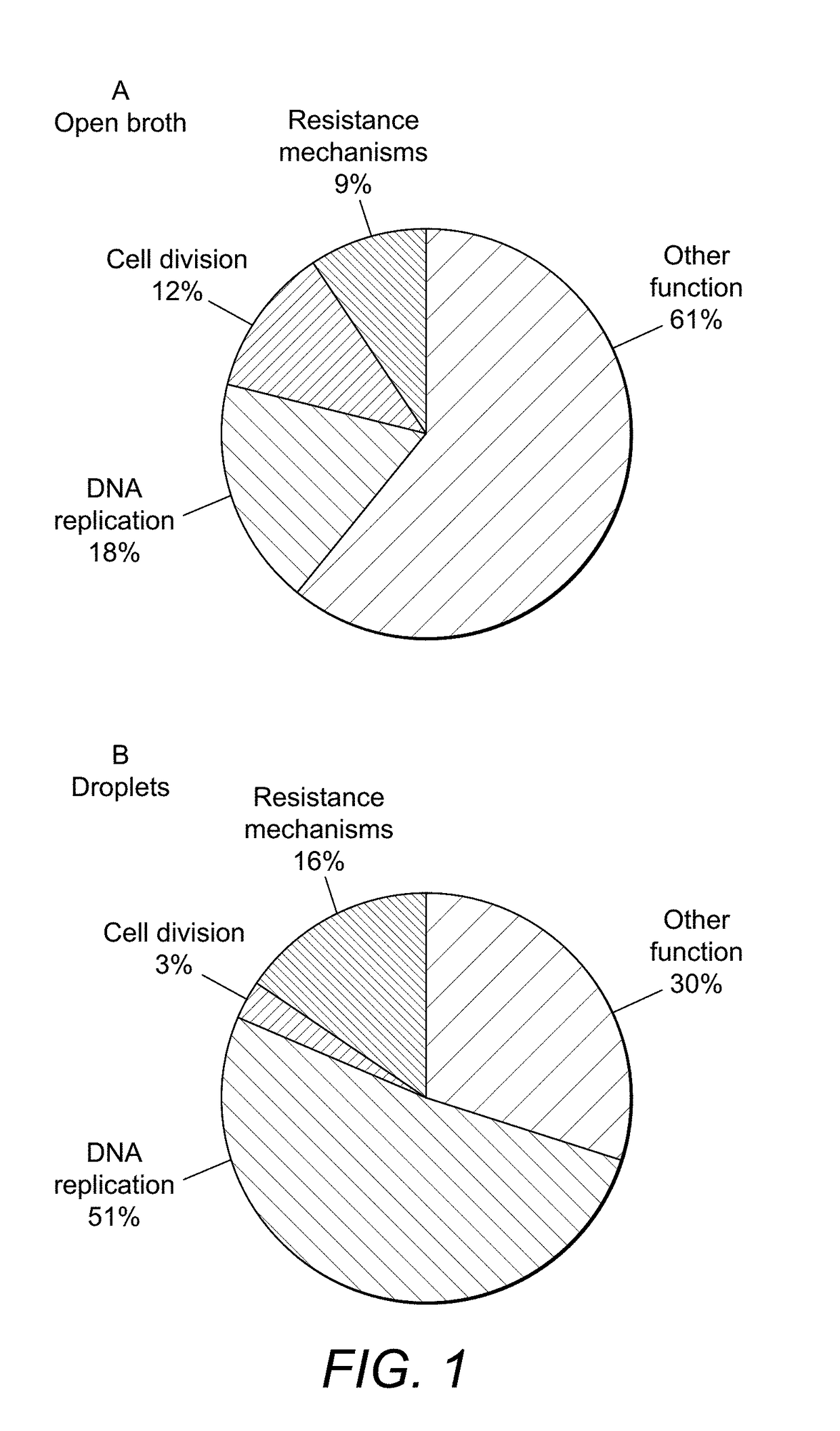Identifying genes involved in antibiotic resistance and sensitivity in bacteria using microcultures
a technology of which is applied in the field of identifying genes involved in antibiotic resistance and sensitivity in bacteria using microculture, can solve the problems of surprisingly high losses of antibiotic resistant mutants of interest which are “swamped", and cannot distinguish between essential genes and essential genes serving as antibiotic targets. , to achieve the effect of high growth rate and loss of fitness
- Summary
- Abstract
- Description
- Claims
- Application Information
AI Technical Summary
Benefits of technology
Problems solved by technology
Method used
Image
Examples
example 1
tion Using Single Emulsion
[0185]Oil Mix for Continuous Phase[0186]73% Tegosoft DEC (Evonik), 20% light mineral oil (Fisher), 7% Abil WE09 (Evonik) (surfactant)[0187]70% Tegosoft DEC (Evonik), 20.3% light mineral oil (Fisher) 4.5% Span-80 (surfactant), 4.8% Tween20 (surfactant)[0188]90% light mineral oil, 10% Span-80 (surfactant)
[0189]All oil mixes need to be made at least 30 minutes prior to use but can be kept indefinitely.
[0190]Aqueous Growth Media for Dispersed Phase
[0191]This may be selected from the following:[0192]SOC broth (20 g / L tryptone, 5 g / L yeast extract 10 mM NaCl, 2.5 mM KCl, 10 mM MgCl2, 10 mM MgSO4 and 20 mM glucose)[0193]SOC+5% Glycerol[0194]LB broth (10 g / L Peptone, 5 g / L Yeast extract, 10 g / L NaCl)[0195]2×YT (16 g / L tryptone, 10 g / L Yeast Extract, 5 g / NaCl)[0196]2×YT+0.5% Glucose and 5% Gylcerol[0197]2×YT+5% glycerol[0198]Peptone glycerol media 5 g / L peptone, 5% glycerol
[0199]The inclusion of glycerol as a carbon source can facilitate microdroplet formation by vo...
example 2
tion Using Double Emulsion
[0209]Aqueous Growth Media
[0210]As in Example 1 (above).
[0211]Mixes Used to Produce Outer Aqueous Phase[0212]Phosphate buffered Saline (PBS; 10 mM phosphate buffer, 137 mM NaCl) with 2% Tween-20[0213]PBS with 2% Tween-80 (surfactant)
[0214]Oil Mix for Droplet Shells
[0215]As for the oil mixes set out in Example 1 (above).[0216]1. 0.5 ml to 10 ml of growth media containing the target cells at appropriate cell numbers to give [0217]2. This growth media is then overlaid with 1-2× volume of the oil mix.[0218]3. This is the vortexed for between 3-6 minutes (usually 5 minutes) at 12,000-18,000 rpm. The speed varies by oil and media used as well as the desired droplet size as a general rule the higher the speed and the longer the vortexing the smaller the average droplet size although a range of sizes are always generated by this method.[0219]4. The integrity of the droplets and presence of cells within is screened visually under a microscope using phase contrast. A...
example 3
n of Microdroplets Using a Microfluidic Chip
[0226]Droplet generation in a microfluidic allows creation of single and double emulsions. In its simplest form double emulsions are formed by sequential formation of and oil in water droplet and then formation of a second aqueous layer by the same methodology.
[0227]Alternative methods involve simultaneous encapsulation of aqueous phase in oil and then the oil-aqueous droplet in a secondary continuous phase of aqueous media. Droplet formation on a chip leads to generation of highly uniform sized droplets. Size is directly related to the size of the channels on the fluidic and the flow rates used to generate droplets. Microfludic droplet formation allows the use of novel oil and surfactant mixes not available when producing droplets in bulk “top-down” approaches.
[0228]The target cells in suitable growth media are mixed at appropriate ratios to allow for ≦1 target per droplet. This aqueous mixture of cells is then pumped through a microfluid...
PUM
 Login to View More
Login to View More Abstract
Description
Claims
Application Information
 Login to View More
Login to View More - R&D
- Intellectual Property
- Life Sciences
- Materials
- Tech Scout
- Unparalleled Data Quality
- Higher Quality Content
- 60% Fewer Hallucinations
Browse by: Latest US Patents, China's latest patents, Technical Efficacy Thesaurus, Application Domain, Technology Topic, Popular Technical Reports.
© 2025 PatSnap. All rights reserved.Legal|Privacy policy|Modern Slavery Act Transparency Statement|Sitemap|About US| Contact US: help@patsnap.com

